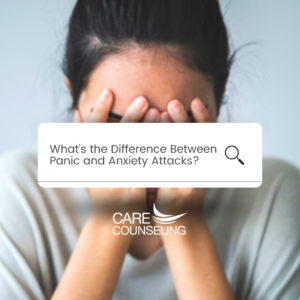Demystifying Anxiety and Panic Attacks
 Anxiety and panic attacks are two distressing experiences that can significantly impact an individual’s mental and physical well-being. While these terms are often used interchangeably, they are distinct phenomena with different characteristics. In this blog, we’ll learn the differences between anxiety attacks and panic attacks to help you better understand these common but often misunderstood conditions.
Anxiety and panic attacks are two distressing experiences that can significantly impact an individual’s mental and physical well-being. While these terms are often used interchangeably, they are distinct phenomena with different characteristics. In this blog, we’ll learn the differences between anxiety attacks and panic attacks to help you better understand these common but often misunderstood conditions.
Anxiety Attacks: A Response to Stress and Worry
Anxiety attacks, also known as panic attacks, are intense surges of anxiety or fear that often occur in response to a specific stressor or worry. These attacks can vary in duration and severity but are typically tied to a triggering situation or thought.
Key Characteristics of Anxiety Attacks
- Triggered by Stress: Anxiety attacks are usually triggered by a specific stressor, such as an upcoming presentation or a financial concern.
- Gradual Onset: They often have a gradual onset, building up over time as the individual ruminates on their source of anxiety.
- Proportional Response: In an anxiety attack, the level of anxiety experienced is often proportionate to the perceived threat or stressor.
- Somatic Symptoms: Physical symptoms such as increased heart rate, muscle tension, sweating, and trembling may be present but are generally less intense compared to panic attacks.
- Worry and Catastrophic Thinking: During an anxiety attack, individuals often experience racing thoughts and excessive worry about potential negative outcomes.
- Duration Varies: The duration of an anxiety attack can range from minutes to hours, depending on the individual’s ability to manage their anxiety.
Panic Attacks: Sudden and Overwhelming
Panic attacks, on the other hand, are characterized by intense and sudden surges of fear or panic that occur without an obvious external trigger. They are more intense than anxiety attacks and can feel overwhelming and debilitating.
Key Characteristics of Panic Attacks
- No Apparent Trigger: Panic attacks often occur seemingly out of the blue, without an obvious trigger or external stressor.
- Abrupt Onset: They have a rapid and abrupt onset, usually reaching peak intensity within minutes.
- Disproportional Response: The level of fear and panic experienced during a panic attack is often disproportionate to any actual threat or situation.
- Severe Physical Symptoms: Panic attacks are associated with severe physical symptoms, such as a racing heart, shortness of breath, chest pain, dizziness, and a sense of impending doom.
- Sense of Losing Control: During a panic attack, individuals may feel as if they are losing control, going crazy, or even dying.
- Brief Duration: Panic attacks are typically shorter in duration, lasting only a few minutes, but they can feel much longer to the person experiencing them.
Overlap and Coexistence
It’s important to note that anxiety attacks and panic attacks are not mutually exclusive. They can coexist, and individuals who experience one may also experience the other at different times. For example, someone with generalized anxiety disorder (GAD) may have frequent anxiety attacks in response to specific stressors but also experience occasional panic attacks without a clear trigger.
Seeking Help and Coping Strategies
Both anxiety and panic attacks can be distressing and disruptive to daily life. If you or someone you know is struggling with these experiences, seeking help is essential. Here are some coping strategies and steps to consider:
- Professional Support: Consult a mental health professional who can provide a proper diagnosis and recommend appropriate treatment options.
- Cognitive-Behavioral Therapy (CBT): CBT is a highly effective therapy for both anxiety and panic disorders. It helps individuals identify and challenge negative thought patterns and develop coping strategies.
- Medication: In some cases, medication may be prescribed to manage the symptoms of anxiety or panic disorders. Consult a healthcare provider for guidance.
- Self-Care: Engage in self-care practices such as regular exercise, maintaining a balanced diet, getting adequate sleep, and practicing relaxation techniques like deep breathing and mindfulness.
- Support System: Lean on your support system—friends and family can provide emotional support during challenging times.
Anxiety attacks and panic attacks are related but distinct experiences. While both involve intense feelings of fear and anxiety, they differ in their triggers, intensity, and duration. Recognizing these differences is the first step in seeking appropriate help and developing effective coping strategies. With the right support and treatment, individuals can manage and overcome the challenges posed by anxiety and panic attacks.



























